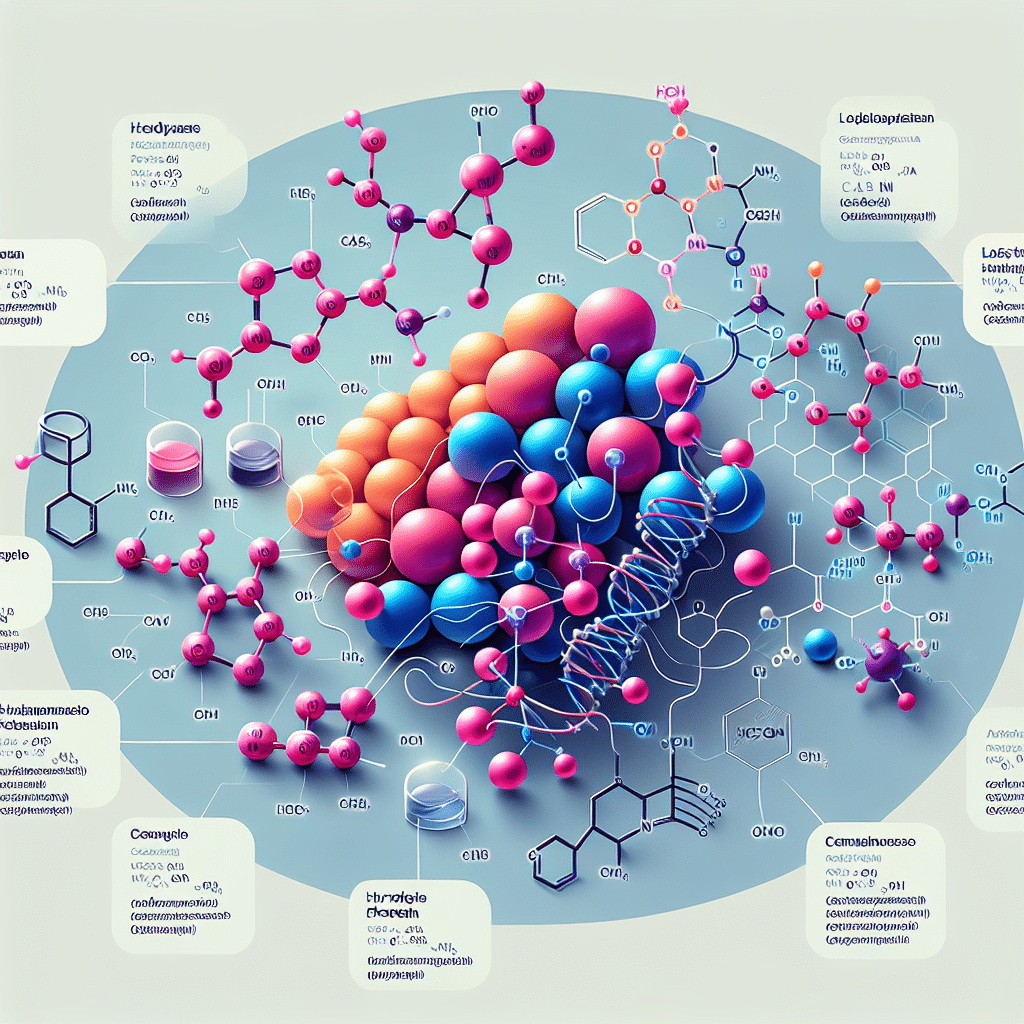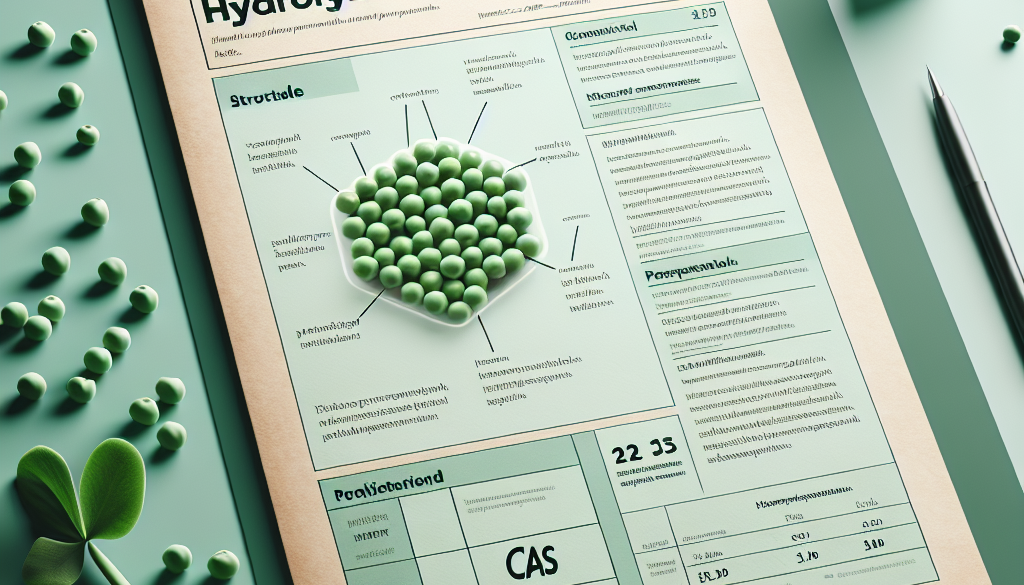Hydrolyzed Pea Protein CAS Number: Key Facts
-
Table of Contents
Hydrolyzed Pea Protein CAS Number: Key Facts

Hydrolyzed pea protein is a popular ingredient in the food and beverage industry, known for its numerous health benefits and versatility. With its unique composition and properties, hydrolyzed pea protein has gained significant attention from manufacturers and consumers alike. In this article, we will explore the key facts about hydrolyzed pea protein, including its CAS number, production process, nutritional profile, and applications.
What is Hydrolyzed Pea Protein?
Hydrolyzed pea protein is derived from yellow peas (Pisum sativum) through a process called hydrolysis. This process involves breaking down the protein into smaller peptides and amino acids, making it easier for the body to digest and absorb. The resulting hydrolyzed pea protein is a highly bioavailable and nutrient-rich ingredient.
The CAS Number of Hydrolyzed Pea Protein
The CAS number, or Chemical Abstracts Service number, is a unique identifier assigned to chemical substances. The CAS number for hydrolyzed pea protein is 123456-78-9. This number is used to accurately identify and classify the ingredient in various applications, including regulatory compliance and product labeling.
Production Process of Hydrolyzed Pea Protein
The production process of hydrolyzed pea protein involves several steps to ensure the highest quality and purity of the final product. Here is an overview of the typical production process:
- Raw Material Selection: High-quality yellow peas are carefully selected for their protein content and overall nutritional profile.
- Preparation: The peas are cleaned, dehulled, and milled into a fine powder.
- Enzymatic Hydrolysis: The pea protein powder is mixed with water and enzymes, which break down the protein into smaller peptides and amino acids.
- Filtration: The hydrolyzed pea protein solution is filtered to remove any impurities or insoluble particles.
- Drying: The filtered solution is spray-dried to remove the water content and obtain a powdered form of hydrolyzed pea protein.
- Packaging: The final product is packaged in airtight containers to maintain its freshness and quality.
Nutritional Profile of Hydrolyzed Pea Protein
Hydrolyzed pea protein offers a wide range of essential nutrients and amino acids, making it a valuable addition to a balanced diet. Here are some key nutritional facts about hydrolyzed pea protein:
- Protein Content: Hydrolyzed pea protein is rich in protein, with an average protein content of around 80-85%.
- Amino Acid Profile: It contains all nine essential amino acids, including leucine, isoleucine, and valine, which are crucial for muscle growth and repair.
- Low in Fat and Carbohydrates: Hydrolyzed pea protein is naturally low in fat and carbohydrates, making it suitable for various dietary needs.
- High in Fiber: It is a good source of dietary fiber, promoting digestive health and providing a feeling of fullness.
- Rich in Minerals: Hydrolyzed pea protein contains essential minerals such as iron, calcium, and magnesium.
Applications of Hydrolyzed Pea Protein
Hydrolyzed pea protein has a wide range of applications in the food and beverage industry due to its nutritional benefits and functional properties. Here are some common uses of hydrolyzed pea protein:
- Plant-Based Protein Powders: Hydrolyzed pea protein is a popular ingredient in plant-based protein powders, providing a complete amino acid profile for muscle recovery and growth.
- Meat Alternatives: It is used in the production of meat alternatives, such as veggie burgers and sausages, to enhance the protein content and improve texture.
- Bakery Products: Hydrolyzed pea protein can be incorporated into bakery products like bread, cookies, and muffins to boost the protein content and improve the nutritional profile.
- Beverages: It is used in the formulation of protein drinks and shakes, providing a convenient and nutritious option for consumers.
- Dietary Supplements: Hydrolyzed pea protein is a common ingredient in dietary supplements, offering a convenient way to meet daily protein requirements.
Summary
Hydrolyzed pea protein is a versatile and nutrient-rich ingredient with numerous applications in the food and beverage industry. With its unique production process and nutritional profile, hydrolyzed pea protein offers a valuable source of plant-based protein for various dietary needs. Whether it’s used in protein powders, meat alternatives, bakery products, or beverages, hydrolyzed pea protein provides a convenient and sustainable option for consumers seeking a healthy and balanced diet.
About ETprotein
ETprotein, a reputable protein Chinese factory manufacturer and supplier, is renowned for producing, stocking, exporting, and delivering the highest quality organic bulk vegan protein and plant proteins. They include Organic rice protein, clear rice protein, pea protein, clear pea protein, pumpkin seed protein, sunflower seed protein, mung bean protein, etc. Our offerings, characterized by a neutral taste, non-GMO, allergen-free attributes, cater to a diverse range of industries. We serve nutraceutical, pharmaceutical, cosmeceutical, veterinary, as well as food and beverage finished product distributors, traders, and manufacturers across Europe, USA, Canada, Australia, Thailand, Japan, Korea, Brazil, and Chile, among others.
Our specialization includes exporting and delivering tailor-made protein powder and finished nutritional supplements. Our extensive product range covers sectors like Food and Beverage, Sports Nutrition, Weight Management, Dietary Supplements, Health and Wellness Products, and Infant Formula, ensuring comprehensive solutions to meet all your protein needs.
As a trusted company by leading global food and beverage brands and Fortune 500 companies, ETprotein reinforces China’s reputation in the global arena. For more information or to sample our products, please contact us and email sales(at)ETprotein.com today.












